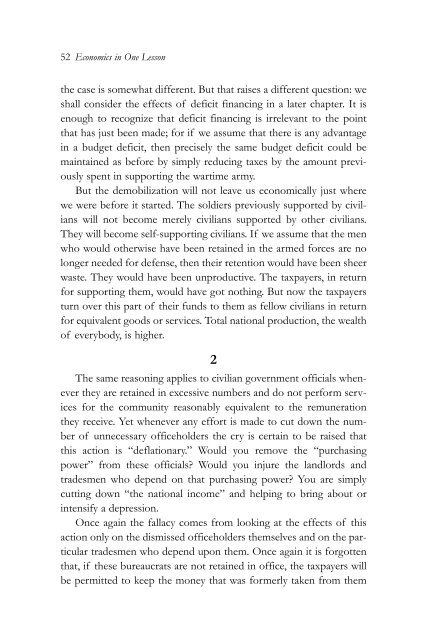1gDdM7w
1gDdM7w
1gDdM7w
- No tags were found...
Create successful ePaper yourself
Turn your PDF publications into a flip-book with our unique Google optimized e-Paper software.
52 Economics in One Lessonthe case is somewhat different. But that raises a different question: weshall consider the effects of deficit financing in a later chapter. It isenough to recognize that deficit financing is irrelevant to the pointthat has just been made; for if we assume that there is any advantagein a budget deficit, then precisely the same budget deficit could bemaintained as before by simply reducing taxes by the amount previouslyspent in supporting the wartime army.But the demobilization will not leave us economically just wherewe were before it started. The soldiers previously supported by civilianswill not become merely civilians supported by other civilians.They will become self-supporting civilians. If we assume that the menwho would otherwise have been retained in the armed forces are nolonger needed for defense, then their retention would have been sheerwaste. They would have been unproductive. The taxpayers, in returnfor supporting them, would have got nothing. But now the taxpayersturn over this part of their funds to them as fellow civilians in returnfor equivalent goods or services. Total national production, the wealthof everybody, is higher.2The same reasoning applies to civilian government officials wheneverthey are retained in excessive numbers and do not perform servicesfor the community reasonably equivalent to the remunerationthey receive. Yet whenever any effort is made to cut down the numberof unnecessary officeholders the cry is certain to be raised thatthis action is “deflationary.” Would you remove the “purchasingpower” from these officials? Would you injure the landlords andtradesmen who depend on that purchasing power? You are simplycutting down “the national income” and helping to bring about orintensify a depression.Once again the fallacy comes from looking at the effects of thisaction only on the dismissed officeholders themselves and on the particulartradesmen who depend upon them. Once again it is forgottenthat, if these bureaucrats are not retained in office, the taxpayers willbe permitted to keep the money that was formerly taken from them


